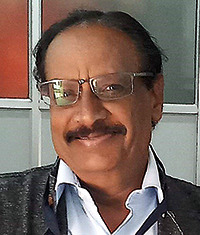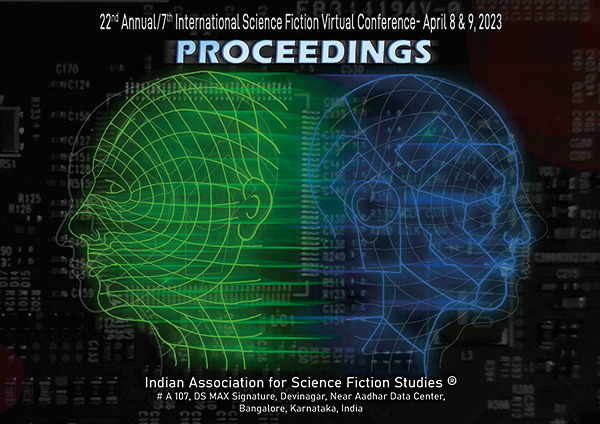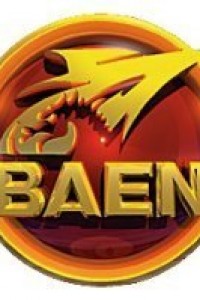SF in India

The Indian Association for Science Fiction Studies, Bangalore, India held the 22nd Annual/7th International Science Fiction Virtual conference on April 8-9, 2023. The student community occupied the central stage in organizing the entire event successfully. Provisions were made for streaming the session videos after 12 hours so that the participants on the other side of the globe could watch conveniently online.
The conference began with Indian classical instrumental music, nadaswaram. For the first time, the students replaced a famous guest in lighting the lamp, which symbolically marks the inauguration of the event.
The eminent literary figure Tarlochan Singh Anand, chief editor of the Literary Voice and currently a resident of Canada, delivered the inaugural speech. SF writer, critic, editor, and webmaster of adbhut.in Dinker Charak delivered the keynote address, while former principal Purushothaman delivered the presidential address during the inaugural session.
There were more than a dozen thematic sessions in each one of the past 23 conferences organized by IASFS. During the present conference, the organizer has focused on two main menus in the form of mega panel discussion sessions: “Issues Related to Research” and “My Experiments with Science Fiction Writings”. Those were followed by paper presentations on varied topics and self-authored story reading sessions, all centered on science fiction.
While briefing about the present conference, Secretary-General Srinarahari Mysore cited Science Fiction in the Real World (1990) by Norman Spinrad, which distinguishes SF from other forms of literature: “Historical fiction is about the past, contemporary fiction is about the present, science fiction is about the future.” He quoted Isaac Asimov, who observed that the future has not arrived yet, and suggests that SF could shape the future as we desire. He mentioned what Alvin Toffler observed about the impact of SF in Future Shock, and quoted Theodore Sturgeon, who defined SF as “a story about human beings, with a human problem, and a human solution, which would not have happened at all without its science content.” Srinarihari observed that the Indian SF stories in anthologies beginning with It Happened Tomorrow (1993) edited by Bal Phondke, up to the recently published Silver Lining, could also be labelled as “Anthropocentric.” In the light of the study of the change in the attitudes of human beings with the advent of science and technology, the speaker considered the relationship between people and machines. Machines could be enslaved, or equal to humans, or they could be masters. Human masters face no conflict if the machine serves them as per their command.
There is news that a robot teaches physics, chemistry and mathematics flawlessly at Indus institution in Bangalore, India. Similarly, Neil Clarke, the editor of Clarkesworld, has shared that he has received 500 AI-generated story submissions. A question arises regarding how humans could react to the concept of a machine trying to become human. Will the fate of the machine be decided as in the case of the humanoid robot in Asimov’s The Bicentennial Man (1976)? What if the AI becomes master of us? N.R. Narayana Murthy, the founder of Infosys, looked back at the advent of smartphones and computers, which we thought “would make us more free. It has not happened.” Regarding the impact of AI, he says, “humans have the power of the mind which no machine can compete with.”
Concluding his briefing, Srinarahari explained that panelists and paper presenters would discuss whether humans would remain supreme, or whether AI would take over and attain the position of a “Mechanical God.” In turn, this would contribute to the study of the change in the attitude of human society by the influx of new technology.
In his inaugural speech, Tarlochan Singh Anand observed that IASFS has been promoting research in the field of SF ever since its establishment in 1998. Science fiction is a body of literature with innumerable authors, and their contributions have been significant in the fields of utopia, dystopia, and alien encounters during the 20th century. The professor also cited a number of works of soft science fiction and works about climate change. SF also raises questions regarding future and potential consequences in the fields of artificial intelligence, genetic engineering, and biotechnology. It also deals with modern society, the impact of technology on humanity, the role of science and scientific progress, the relationship between humanity and the environment, and the nature of humanity itself. What makes speculative narrative so relevant to the contemporary times? One of the primary reasons is that SF explores and imagines potential future implications of the scientific and technological developments.
Additionally, SF can serve as social commentary highlighting the flaws and inequalities of the present time. SF often explores the potential consequences of scientific social technological innovations. Speaking on its impact, he opined that SF will inspire the young people to pursue careers in science, technology, and mathematics, and suggest methods of solving problem. We must never forget that science fiction is a genre which entertains people of all ages. It has been a source of inspiration for media and folk culture, including video games and films.
The professor observed that apart from the paper presentations, the present conference has given a platform for two panel discussions, one on “Issues Related to SF Research” by doctoral research supervisors, and the other on “My Experiments with SF Writings” by authors. This makes the association stand apart from other global academic association in its innovative activities. He recalls that there was a session dedicated to “scholars speak” during the previous conference which alowed the doctoral scholars to freely express their issues. At the end, the professor expressed his delight and feeling of honor at inaugurating such a unique conference.
KEYNOTE ADDRESS
In his keynote address, Dinker Charak recalled that the association had opened up 1998 and ’99. That was the time when HTML-based websites and forums were new, and provided a way for authors and fandom to converse. He recalled the early days, when writers had to mail in story submissions, and magazines were available only in print. But during later years, web pages published stories, with links shared among friends, and readers could comment and make recommendations. That allowed authors to publish their stories online on these websites and webzines. Publishing tools became more readily available, and as a result, self-publication became easier. A few days back, the speaker was at a World Book Fair in Delhi. He was amazed tonote the number of publishers and booksellers. The search engines now reflect that in a country like India there are more than 500 authors writing and publishing science fiction.
The speaker wondered whether we are going back to Asimov, Arthur C. Clarke, and Jayant Narlikar’s works, or taking into account the self-authored works with lot of readers’ ratings to understand the present trend. Ultimately, the relationship between SF and technology has reached another dimension. In this regard, he observed that technology is shaping the genre of science fiction. He demonstrated how one could make use of AI like ChatGPT to develop a sci-fi story. Is that story writing by an author? Whose creativity is it? The writer directed the AI to write a story. In this world, good writing is made a commodity. What is the contribution of the author? Is it an idea, a story, a twist, the climax, or the build-up? Narration and writing skills have all become a commodity. The ability of author A to give better instructions to the AI than the author B will become a parameter for the production of a good narrative. One could add additional inputs to develop a story or article. There would be input by humans, and then ChatGPT would develop the idea in many paragraphs. It would be the reader’s choice to receive a story of a hundred pages, or a longer version of one thousand pages. How does the reader wish to conceive a story in terms of the length? They could convert a 50-page story to a voluminous one. Technology will be in the hands of the reader in the future. What does a good sci-fi story of the future look like?
The speaker sought a definition of a good sci-fi story. Are they the stories published on websites? Self-published stories? Lengthy stories created by AI? Short stories written originally by human authors? Stories produced in collaboration with AI? AI may get us more stories of the type we wish for. How can we judge them? More research on the area may allow for a scholarly study, analysis, and judgement. A reader’s background will surely play a vital role in judging them and classifying the stories as good sci-fi.
PRESIDENTIAL ADDRESS
Purushothaman’s presidential speech recalled that as many as ten collaborators were involved in organizing the most recent online conference. Later we thought of organizing an offline conference, which did not take place. The online conference does not involve heavy funding and hospitality. It is unique in itself as it is a research-oriented, academic event, with more paper presentations than in its earlier times, along with panel discussions by research supervisors and eminent authors.
The authors took part in a panel discussion on the topic, “My Experiments with SF Writings.” What draws everyone’s attention is the AI ChatGPT’s involvement in producing research papers or SF stories. The technology not only creates an impact on the writer, but also on the reader. The advent of this new technology highlights what science fiction is all about. We thought of merging this idea of academic work and creative work in two-panel discussion so that more people could find interest in these activities. We were all afraid of the third world war, which was supposed to be a nuclear war. But now, that seems unlikely. The technology we have is of two types: one is conceived in the form of hardware and the other the software. Software is not seen as such a great threat, but it may threaten us. The AI, which could be advantageous or harmful, may one day be programmed in the service of humanity only. Concluding his address, he quoted Kim Stanley Robinson, who said, “The whole world today is like a science fiction novel that we are all writing together.”

PANEL DISCUSSION I
The inaugural function was followed by the panel discussion on the topic “Issues Related to SF Research.” The session was moderated by Professor Ravichandra CP, former eminent professor of the Postgraduate Department of English, University of Mysore, Mysore, Karnataka. Professor Ravichandra introduced the panel members, and as a preamble, discussed science fiction as a study of conflict or crossing the border between human and nonhuman. Considering various aspects of the issues related to research, the moderator tried to focus on the question, “What is central to science fiction research?” The team of panelists was Anbarasi V, principal, Government College, Salem District, Tamil Nadu, India; Amitabha Bhattacharji, Sikkim University, Sikkim State, India; Kasturi Sinha Ray, PG Department of English, GLA University, Mathura, Uttara Pradesh, India; Nataraju G, Department of English, Karnataka State Open University, Mysore, Karnataka, India; Priyanka Tripathi, associate professor & head, Department of English, Indian Institute of Technology, Patna, Bihar State, India; Purushothaman KS, principal (Rtd), Government College, Krishnagiri, Tamil Nadu, India; Ratnakar D Bhelkar, professor & head (Rtd), Department of English, Dhanwate National College, Nagpur, Maharashtra State, India; Rukmini Krishna, associate professor, Department of English, School of Social Sciences & Languages, VIT University, Vellore, Tamil Nadu, India; Santhosh GK, PG Department of English, Vijayanagara Sri Krishnadevaraya University, Bellary, Karnataka, India; Shreya Bhattacharji, Centre for English Language, Central University of Jharkhand, Ranchi, Jharkhand State, India; and Sonali Santosh Kadam, associate professor, Department of Botany, RP Gogate & RV Jogalekar College, Ratnagiri, Maharashtra State, India. They all expressed their views regarding the issues and the plausible remedies.
PAPER PRESENTATIONS
A number of scholars presented their papers on various topics ranging from science and technology, science fiction, languages, literature, humanities, and social sciences. Prominent paper presenters included scholars Dhivya Shikar, Manasa G, Maryam binth Salim, Meenal R. Kale, and Aman Deep Singh.
One of the papers which attracted a large audience for interaction was “Every Word Matters” by Wendy Van Camp, Anaheim Poet Laureate, California, USA. It is worth mentioning here two prominent authors, Madhu Chittarvu, Hyderabad, Telangana State, Harish Goyal, Ajmer, Rajasthan state and Sonali Santhosh Kadam, Ratnagiri, Maharashtra State, who partook in the self-authored SF story reading session.
The sessions were chaired by professors, research supervisors, and eminent scientists such as Sudhir Matapathy Panchakshari Associate Professor English Latur, Maharashtra; Ahilya Barure, Associate Professor English, Ambajogal, Beed Dist, Maharashtra; Aman Deep Singh English Dept, Nirma University, Gujrat; Barnali Chetia IIIT, Vadodara; Saadulla Khan, PG Department of English, Amity University, Jaipur, Rajasthan State, and Vasudeva P. Rao, Scientist, Senior Project Manager (Pure Software Ltd), Bangalore.
DAY TWO
The deliberation of the second day of the conference began by highlighting the works of late Gokulananda Mahapatra, a scientist and an Oriya science fiction writer, under the title of the program “Master Stroke”.

PANEL DISCUSSION II
That program was followed by a marathon session involving 16 authors for a panel discussion on the topic “My Experiments with SF Writings.” The session was moderated by Ranjan Garge, former principal from Aurangabad, Maharashtra, who has published 60 SF works. The panelists were Aadram Nayak, Tehsildar, Sadulshahar, Ganganagar, Rajasthan State; Ashish Mahabal, astronomer, Caltech, Pasadena CA, USA; Ayesha Era Natarasan, Cuddalore, Tamil Nadu State; Barnali Chetia, head of the Department of Sciences & Humanities, Indian Institute of Information Technology, Vadodara (IIIT), Gujarat State; Debjyoti Bhattacharyya, Partner and Director, Joydhak Prakashan, Kolkata, West Bengal State; Lucie Lukačovičová, philosophical faculty, Charles University, Prague, Czech Republic; Madhu Chittarvu, diabetologist & cardiologist, head, Department of Medicine, Hyderabad, Telangana State; Nilesh Malvankar, SF writer, Maryland, USA; Ravi Kopparapu, planetary scientist, NASA, Louisiana, USA; Sadhna Shanker IRS, principal director general, income tax, New Delhi, India; Savitha Srinivas IPS, Bangalore City Police, Karnataka State, India; Seema Kulkarni, coordinator, CWO Refugee Learning Center, Kuala Lumpur, Malaysia; Shantala, gynecologist & obstetrician, Bangalore, Karnataka State; Shweta Taneja, SF writer, California, USA; Smita V Potnis, Kandivali (East), Mumbai, Maharashtra State, India; and Zeashan Zaidi, ERA’s Medical College, Lucknow, Uttara Pradesh, India.
Hayavadana (1975), a play by Jnanpith Awardee Girish Karnad, was a source of inspiration to understand one of the views of Indian Philosophy which tries to advocate the idea that “there is completeness in incompleteness.” Similarly, the present conference report writer most humbly directs the esteemed readers to visit the official website of IASFS at <iasfs.in> to browse the conference menu and watch videos of each speaker’s talk, and to have their own firsthand experience of the conference.
–Srinarahari Mysore
This report and more like it in the July 2023 issue of Locus.
 While you are here, please take a moment to support Locus with a one-time or recurring donation. We rely on reader donations to keep the magazine and site going, and would like to keep the site paywall free, but WE NEED YOUR FINANCIAL SUPPORT to continue quality coverage of the science fiction and fantasy field.
While you are here, please take a moment to support Locus with a one-time or recurring donation. We rely on reader donations to keep the magazine and site going, and would like to keep the site paywall free, but WE NEED YOUR FINANCIAL SUPPORT to continue quality coverage of the science fiction and fantasy field.








